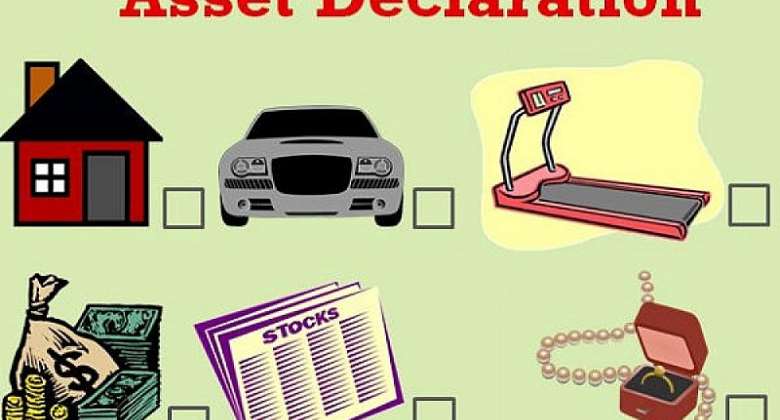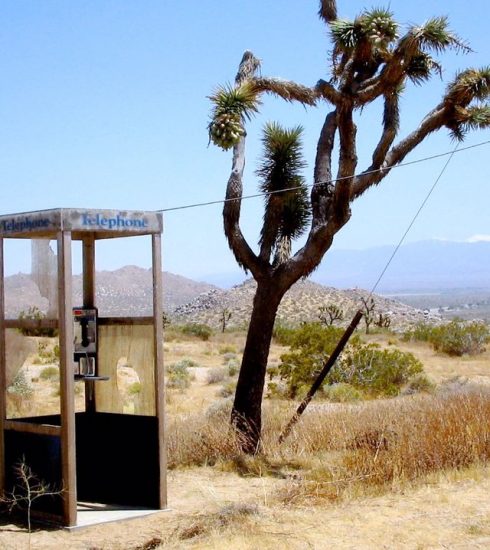Asset declarations that really serve no purpose: the case of Ghana’s asset declaration regime by Frederick Agaaya Adongo
- INTRODUCTION
It is probably the case that the most ever-enduring and all-besetting terror of contemporary Ghanaian society is the canker of corruption, which has sickened us throughout our history. Events of the past, together with recent ones, vividly suggest that the DNA of particularly the public sector in Ghana was infused with a horrendous virus of corruption right from the day of its birth, and to this day, no antidote has yet been found for it. And like a sharp tongue which gets keener with constant use, corruption gets more sinister and grows deeper roots, the more frequently people engage in it. Corruption has become endemic to the extent that every facet of the Ghanaian society experiences its fair share of it, ranging from the littlest forms of it to the most scandalous ones. It even stretches its tentacles into religious spheres. Pathetically, many of the actors in this flourishing field of corruption have so anaesthetized their consciences that they see corruption of whatever form as natural and inevitable, regardless of its dire consequences. Owing to this mental structure, persons who try to give corruption a huge distance have often been vilified and mocked at.
In an attempt to minimize the occurrence of public sector corruption, the laws of Ghana require certain public office holders to declare in writing their assets and liabilities before assuming office, periodically during their tenure and upon the completion of their term of office. Nevertheless, there still seems to be some recognized challenge, not only in terms of the deficiency of the asset declaration regime, but also as regards the non-compliance with the laws on asset declaration by a large section of public officers, rather than a petulant few.
The number of instances where public office holders failed to declare their assets and liabilities, notwithstanding that the law requires of them to do so, are so pervasive that their detailing is impractical. But the most publicized examples which are still fresh on the minds of a large segment of the Ghanaian society is the recent saga surrounding Adjenim Boateng Adjei and the late Kwadwo Owusu Afriyie (alias Sir John).
Adjenim Boateng Adjei was, prior to his dismissal from office by the President, the Chief Executive Officer of the Public Procurement Authority. He failed to declare his assets and liabilities on assuming office in that capacity, among other scandalous allegations of corruption.[1] Also, a recent investigation conducted by The Fourth Estate revealed that the late Sir John failed to declare his assets and liabilities on assuming office as the Chief Executive Officer of the Forestry Commission.[2]
In the light of these crowning achievements in suspected corruption and flagrant disregard of the law, the author deems it of signal importance to try to examine the state of Ghana’s asset declaration regime and point out its deficiencies and to propose ways of making it more vibrant. Following the introduction, this paper examines the role that asset declaration plays in the fight against corruption and the history of Ghana’s asset declaration regime. Thereafter, the current posture of Ghanaian law as regards the declaration of assets is examined. After this, the inadequacies of the present asset declaration regime are examined, followed by a conclusion and recommendations that will help improve the efficacy of the regime of asset declaration in Ghana.
- THE ROLE OF ASSET DECLARATION IN FIGHTING CORRUPTION
The requirement to declare assets is not sought as an end in itself. Figuratively speaking, asset declaration regimes are merely designed as chisels for carving out certain desired artifacts. It is therefore the case that every system of asset declaration has a legitimate objective to achieve, which may vary from that which is sought to be achieved in another system.
In our peculiar circumstances, given our history as recounted immediately below, there can be no doubt that the purpose of asset declarations in our country is to fight corruption. It must be noted that the Constitution enjoins the State to ensure that corruption is eradicated from the Ghanaian society.[3] This demonstrates that getting rid of corruption is one of the desirable objectives that the Constitution is committed to honouring. It is therefore not farfetched to assert that asset declaration, at least in our jurisdiction, is a preventive mechanism intended to prevent corruption on the part of public officers.
The role of an efficient and effective asset declaration regime in any dispensation cannot be overemphasized. It is of benefit both to the state and even the persons required to declare their assets. Without doubt, where there is an effective asset declaration regime, abuse of power, corruption and dissipation of public property would be reduced to the barest minimum, if not completely eradicated. Where assets are declared by holders of public offices, properties that are ill-gotten through corrupt practices and unexplained means can be brought to check and culprits dealt with according to law.
Asset declaration therefore plays a significant role in preventing abuse of power, protecting public property from wanton dissipation, ensuring public sector accountability and thereby, ultimately, avoiding corruption on the part of public office holders.[4] Honest and full asset declaration is also beneficial to the declarants, in the sense that the declarations help protect their private properties from wrongful confiscation, even as they save them from undue suspicion and baseless allegations of wrongdoing on the part of the general public.[5]
- HISTORY OF ASSET DECLARATION IN GHANA
In order to appreciate the rationale for the asset declaration regime in our laws, it is important to take a little historical tour. Without a sense of history, it is seemingly impractical to appreciate the present and give directions to the future. The present may be viewed in some sense as a shadow cast by the past, and can only be understood better with a sense of history. It is in that sense that it is relevant herein to journey into the archives of history, albeit cursorily, to ascertain the origin of asset declaration laws in Ghana and how they have fared over the years.
- Assets Commissions of Enquiry
The buoyancy of hope for a brighter future that characterized the independence of Ghana from the shackles of political colonialism was marred soon thereafter. Corruption was on the rise right from the onset of the First Republic. Flamboyant and opulent lifestyles of many public officers, coupled with unexplained wealth became the order of the day. These developments outraged the general public, so much so that they have popularly been cited as part of the key factors that accounted for the overthrow of the Nkrumah-led government of the First Republic.
Consequently, soon after assuming the reins of government, the National Liberation Council (NLC), the military cum police force that overthrew the Nkrumah government, set up a number of Commissions of Enquiry to enquire into the assets of specified persons, and to determine the modes of acquisition of those assets. Notable among these were the Jiagge Assets Commission of Enquiry (established under N.L.C.D. 72) to investigate certain persons who had acquired assets unlawfully while holding public office and the Fred Kwasi Apaloo Commission to Enquire into the Kwame Nkrumah Properties (Accra-Tema, 1966). The Assets Commissioners in their various reports revealed that many of the persons who were investigated acquired assets illegitimately. The Apaloo Commission for instance found that Nkrumah owned several landed properties, both in Ghana and abroad, and had so much money to his credit in banks which were illegitimately acquired, mainly through corrupt practices.[6] Many office holders were also found to have dissipated public property with careless abandon.[7]
- Asset Declaration under the 1969 Constitution
In an attempt to reduce the recurrence of corruption on the part of key public officers and promote public sector accountability, the Constitutional Commission in the ‘Proposals of the Constitutional Commission for a Constitution for Ghana, 1968’ drawing inspiration from the immediate past experience as revealed by the Assets Commissions of Enquiry, made recommendations for the introduction of an asset declaration regime into our laws for the first time. The Commission made recommendations for holders of certain public offices to declare all their assets and liabilities on the assumption of those offices. Based on the recommendations of the Commission, the Prime Minister, Minister of State or Ministerial Secretary[8], Speaker of the National Assembly[9] and members of the National Assembly[10] were required to declare their assets and liabilities on assuming office, under the 1969 Constitution. It is relevant to note that the Commission recommended that the President on assuming office shall declare his assets and liabilities.[11] However, the final 1969 Constitution did not include a provision requiring the President to declare his assets and liabilities, presumably having been abandoned in the process of making the Constitution, for reasons which I cannot immediately point out.
- Asset Declaration under the 1979 Constitution
The 1979 (Third Republican) Constitution was the first in history to have introduced a full chapter, providing for the ‘Code of Conduct of Public Officers’.[12] Thus, the 1979 Constitution sought to consolidate the asset declaration provisions and provisions on conflict of interest on the part of public officers into a distinct identifiable chapter in the Constitution, unlike the 1969 Constitution which had them scattered in different chapters. Under the 1979 Constitution, it was provided that holders of certain public offices were to submit to the Auditor-General written declarations of all properties or assets and liabilities held by them and their spouses, directly or indirectly, within three months after the coming into force of the Constitution or after taking office, as the case may be.[13] The Auditor-General was required to submit a written declaration of his assets to the President.[14]
The Third Republican Constitution required public officers, while in office, to make declarations of their assets at the end of every two years of their tenure.[15] They were also supposed to declare their assets at the end of their term of office.[16] The Constitution also made the making of a false declaration and the acquisition of unexplained wealth after initial declaration of assets infringements of the Constitution.[17] Further, it provided for access to written declarations submitted by public officers only where it is needed in evidence before a court of law, a commission of enquiry established under that Constitution or the Omudsman in the performance of his functions pursuant to Article 207 of that Constitution.[18]
Allegations of breach of the asset declaration provisions were to be made to the Ombudsman, who was mandated to carry out investigations into the matter, unless the officer concerned admitsedthe allegations, and to decide what appropriate action to take in respect of the findings of the investigation or the admission, as the case may be.[19]
- GHANA’S ASSET DECLARATION REGIME AT PRESENT
The 1992 Constitution spells out the standard of conduct required of public officers so as to avoid instances of conflict of interest, the ill-acquisition of wealth and the mismanagement of public property, and ultimately corruption.[20] It essentially reproduces the provisions of the 1979 Constitution relating to the declaration of assets, save for a few modifications which would be pointed out in a jiffy.
The 1992 Constitution requires the following to submit a written declaration of their assets and liabilities to the Auditor-General: the President of the Republic; the Vice-President of the Republic; the Speaker, the Deputy Speaker and a member of Parliament; Minister of State or Deputy Minister; Chief Justice, Justice of the Superior Court of Judicature, Chairman of a Regional Tribunal, the Commissioner for Human Rights and Administrative Justice and his Deputies and all judicial officers; Ambassador or High Commissioner; Secretary to the Cabinet; Head of Ministry or government department or equivalent office in the Civil Service; chairman, managing director, general manager and departmental head of a public corporation or company in which the State has a controlling interest.[21] In the case of the Auditor-General, he is required to make a written declaration of his assets and liabilities to the President.[22] Comparatively, the 1979 Constitution provided a more extensive list of the officers who were required to declare their assets than the 1969 and 1992 Constitutions.[23]
Nevertheless, the 1992 Constitution empowers Parliament to add to the list of public officers who are required to declare their assets, if Parliament deems it necessary.[24] In exercise of that power, Parliament enacted the Public Office Holders (Declaration of Assets and Disqualification) Act, 1998 (Act 550) in which a tall list of public officers who are required to declare their assets has been provided, thereby extending the coverage of the asset declaration regime far beyond that which pertained in the Third Republic. Among the list are the Governor of the Bank of Ghana and his deputies; the Chairman of the Electoral Commission and his deputies; the Chairman of National Commission for Civic Education and his deputies; the Head of Chancery of Ghana Embassy or Ghana High Commission; Heads of Department of Bank of Ghana.[25]
Those who occupied the aforementioned offices prior to the coming into force of the Constitution were required to make the declarations within three months after the coming into force of the Constitution, and in the case of those assuming office after the coming into force of the Constitution, they shall make their declarations before taking office.[26] This means that it is a necessary prerequisite to the assumption of those offices in respect of which their occupants are required to declare assets that one must have first declared his assets and liabilities prior. This is a significant departure from the Third Republican arrangement, where after the coming into force of the Constitution, public officers were required to declare their assets and liabilities within three months after assuming office. Of particular significance also is the fact that, after making the initial declaration, public officers are required to declare their assets and liabilities in writing at the end of every four years and at the end of their term of office.[27] This is also a marked departure from the 1979 Constitution which pegged the frequency of declaring assets during one’s tenure at the end of every two years.
The list of assets that public officers who are mandated to declare assets are required to declare are: lands, houses and buildings; farms; concessions; trust or family property in respect of which the officer has beneficial interest; vehicles, plant and machinery, fishing boats, trawlers, generating plants; business interests; securities and bank balances; bonds and treasury bills; jewellery of the value of ¢5 million or above; objects of art of the value of ¢5 million or above; life and other insurance policies; and such other properties as are specified on the declaration form in Schedule II of Act 550.[28]
Curiously, it is a breach of the Constitution if after the initial declaration of assets and liabilities, any such declarant acquires assets which cannot reasonably be attributable to income, gift, inheritance or any other reasonable source.[29] The Constitution also requires declarants to be brutally frank with the declarations they make as regards their assets and liabilities. It is thus a contravention of the Constitution for any person required to declare his assets and liabilities to fail to do so, or to make a false declaration.[30] It must be pointed out that the 1979 Constitution did not add failure to make a declaration as one of the acts amounting to an infringement of the Constitution. The inclusion of a failure to declare assets as a constitutional sin is thus a novelty introduced by the 1992 Constitution.
Notably, the 1992 Constitution does not provide for any other circumstance(s) under which the written declarations of assets and liabilities submitted to the Auditor-General may be accessed, except where it is required in evidence before a court of competent jurisdiction, a commission of inquiry appointed under the Constitution or an investigator appointed by the Commissioner for Human Rights and Administrative Justice.[31]
Where it is alleged that a person has failed to declare assets or has declared assets falsely or has acquired unexplained wealth while serving in a public office, such an allegation shall be made to the Commissioner for Human Rights and Administrative Justice.[32] Where the Commissioner is involved, the allegation shall be made to the Chief Justice.[33] On receipt of such allegation, except where the person involved has in writing admitted the allegations, the Commissioner for Human Rights and Administrative Justice or the Chief Justice as the case may be shall cause the matter to be investigated.[34] The Commissioner or Chief Justice has the discretion to decide the appropriate action to take in respect of the results of the investigation or admission.[35]
- DEFICIENCIES OF THE CURRENT ASSET DECLARATION REGIME
Commendable though it is to have a regime for the declaration of assets, the present legal arrangement places some significant fetters on the efficacy of the regime to fight corruption and the dissipation of public property. Regrettably, Act 550 which was expected to add flesh to the bony arrangements in the Constitution is significantly a reproduction of what is already in the Constitution, save for the addition of some categories of officers who are required to declare their assets as well as the list of assets to be disclosed in the declaration. A casual look at the present system of asset declaration presents genuine questions needing answers. It is imperative therefore to identify some of the recognized deficiencies associated with the current asset declaration regime and to suggest possible ways of arresting them.
- The Hands of CHRAJ are Tied
To begin with, it has already been demonstrated that an allegation that a person has failed to declare his assets or has made a false declaration shall be made to the Commissioner of CHRAJ or the Chief Justice who shall then cause the matter to be investigated. This seems to suggest that unless and until a formal allegation is made to the Commissioner or the Chief Justice as the case may be, he has not the competence to investigate whether a person has complied with the asset declaration laws. This position is fortified by the decision of the Supreme Court of Ghana in the Republic v High Court (Fast Track Division) Accra; Ex Parte Commission on Human Rights and Administrative Justice (CHRAJ) (Anane Interested Party)[36] to the effect that CHRAJ cannot on its own initiative conduct investigations into any allegations of corruption pursuant to Article 218(a) of the Constitution in the absence of a formal complaint from an identifiable complainant which is in writing or would be reduced into writing.
In Ex Parte CHRAJ, the applicant Commission, on its own initiative, and in exercise of its powers under Article 218(a) of the Constitution, investigated alleged acts of abuse of office and corruption that were leveled against Dr. Richard Anane, the interested party, in the media. Despite Anane’s protests, CHRAJ continued its investigations without a formal complaint from a specific complainant. CHRAJ made a finding of conflict of interest and abuse of power against Anane. Aggrieved by the findings of CHRAJ, Anane applied to the High Court for, and successfully obtained, an order of the Court quashing the findings of CHRAJ. CHRAJ consequently applied to the Supreme Court for an order of certiorari to quash the decision of the High Court. In the Supreme Court, the issue devolved on whether the word “complaints” as used in Article 218(a) of the 1992 Constitution as the basis for an investigation by CHRAJ, can be made through public discussions and the media or must be made by an identifiable person and put into writing. A vast majority of the Court, led by Wood CJ (with Date-Bah JSC dissenting), interpreted the word “complaints” to mean formal complaints brought by identifiable persons before CHRAJ, and same recorded in writing.
On the basis of the decision of the Supreme Court in Ex Parte CHRAJ, it seems fair to argue that judging from the words of Article 287(1) of the Constitution, where it is even alleged, and it is conspicuously clear, that a person has failed to declare his assets or has made a false declaration or has while in office acquired wealth which is not reasonably attributable to income, gift or other explainable source, CHRAJ is disabled from investigating such allegations, unless there has been a formal complaint from an identifiable person to it. This places a significant limitation on the mandate of CHRAJ, and has the potential of weakening the potency of CHRAJ as an anti-corruption constitutional body. This, ultimately, reduces the asset declaration regime in our laws to mere abstract provisions with no practical efficacy, except in rare cases where specific complainants would make a complaint to CHRAJ to investigate and take action on the outcome of the investigation.
- Nearly Zero Public Access to Declarations
Another conspicuous challenge associated with our current asset declaration regime is that, it does not provide for wide public access to declarations made by public officers of their assets and liabilities. It equally has no mechanism in place for the verification or public scrutiny of asset declarations made by public officers. Curiously, the Public and Political Party Office Holders (Declaration of Assets and Eligibility) Law, 1992, P.N.D.C.L. 280 which was repealed by Act 550 mandated the Auditor-General to publish or cause to be published in the Gazette asset declarations made by persons who were required to declare their assets, within fourteen days of receipt of such declarations.[37] That mandate has, however, been taken away by Act 550.
But it must not be lost on us that public scrutiny and verification of asset declarations made by public officers increases to exponential proportions the value of asset declaration as a counter-measure against corruption, ill-acquisition of wealth and the dissipation of public property; for it affords journalists, civil society and the public at large the opportunity to easily uncover irregularities which may form the basis for formal investigations into the alleged improprieties.[38] Research reveals that there are lower levels of corruption perception in countries where asset declaration comes with it public access and the opportunity to verify those declarations.[39] Thus, lack of public access to the declared assets and liabilities has the tendency of reducing such declarations to mere formalities, which may not really serve the purpose for which asset declaration is necessary.
It may be argued that a person who needs information about declared assets of public officers can access same in exercise of his right to information, and accordingly, there is no need for the publication of the data declared by public officers of their assets and liabilities. But the question devolves on the practical efficacy of that. How many people would want to subject themselves to the rigorous process of requesting such information for the purpose of examining them for their accuracies or possible discrepancies? Moreover, it is probably only in a few cases where perhaps there is a suspicion of impropriety that one may bother himself requesting for information for the purpose of scrutiny. But where the declarations made are published, it makes it easy for the public to access same, and anomalies which may otherwise never have been suspected to warrant a request for information relating thereto would easily be exposed. Public access to the declarations would also compel declarants to make true and honest declarations, since the information would be readily available to the public for scrutiny and verification.
I am not unmindful of the fact that it may as well be argued that the publication of the declarations would amount to unwarranted intrusion into the spheres of public officers’ privacy which are reserved for themselves alone. It is not in doubt that the right to privacy implies that every person has a right to be left alone to live his life free from unwanted intrusion, publicity or public attention. It is within the domain of one’s life to choose to live a secluded and secretive life, away from the attention of the public.[40] A person is therefore assured of his privacy, save that his privacy may be restricted “in accordance with law and as may be necessary in a free and democratic society for public safety or the economic well-being of the country, for the protection of health or morals, for the prevention of disorder or crime or for the protection of the rights or freedoms of others.”[41]
It must be remembered that the Supreme Court has long held that where a breach of a right is alleged, owing to the fact that rights are subject to reasonable limitations, the courts are enjoined to undertake a balancing exercise, to determine whether placing limitations on the individual’s right outweighs the protection of same in the circumstances.[42] Indeed, public order, public safety, public morality, and public interest are all countervailing policy grounds which may warrant dispensing with a person’s rights, and in the present circumstances, the right to privacy.[43] This is premised on the assumption that the fundamental human rights guaranteed under the Constitution are far from being absolute.
In our peculiar circumstances, any interference with privacy would be deemed justifiable if that interference corresponds to a pressing social need that is proportionate to the legitimate aim pursued. Accordingly, a person’s legitimate expectation of privacy is significant, yet it is not necessarily the conclusive and decisive criterion in determining whether private information about him should be made available to the public. In this stead, therefore, it is the author’s considered opinion that the prevention of corruption, ill-acquisition of wealth and wanton dissipation of public property on the part of public officers is a legitimate and serious public interest concern enough to warrant the making public of declarations of assets and liabilities by public officers, although on the superficial outlook it may amount to an intrusion into the private sphere of the individual.
Preventing corruption supersedes an individual’s right to privacy in the public interest because corruption can send a giant nation crashing down on its knees. Corruption stifles economic growth and scares away investors, and virtually plunders the nation into the abyss of despair. Corruption affects a large section of society adversely, making the lives of ordinary citizens worse off. Every pesewa that is lost to corruption translates into denying a citizen access to quality education, quality healthcare, basic social amenities, among others. And given endemicity of corruption in Ghana, it can hardly be maintained that an individual’s right to privacy must be given primacy over the legitimate ends that are bound to be achieved when corruption is done away with.
The European Court of Human Rights had a golden opportunity in the case of Wypych v Poland[44] to consider the scope of asset declarations and publication of same, vis-à-vis the right to privacy. In that case, the applicant was elected to the Kwidzyn Town Council in 2002. On 1st January, 2003, an amendment to the 1998 Local Government (County) Act came into force. The amendment required local councilors to disclose information to the public about their financial status and property portfolio. This was required to be done through a declaration submitted to the president of the local council for subsequent publication in the Public Information Bulletin for the general public to access same. The applicant refused to disclose details of his financial standing and property (including marital property), claiming it was against his right to privacy, and making such data available to the public would expose him and his family to threats of theft and burglary.
While commiserating with him that the requirement to submit the declaration and the online publication of same was violative of his right to privacy, the Court held that it was a justified breach of his privacy as it was reasonably necessary in the circumstances. The court noted, as regards the publication of the publication of asset declarations thus:
“[T]he Court considers that this is a safeguard to ensure that the obligation to make declarations available is subject to public scrutiny. The general public has a legitimate interest in ascertaining that local politics are transparent and internet access to the declarations makes access to such information effective and easy. Without such access, the obligation (to declare assets) would have no practical impotence or genuine incidence on the degree to which the public is informed about the political process.”
Whereas there is no doubt that decisions of the European Court of Human Rights are of no binding force in our jurisdiction, its decisions do suggest some parallels worth considering and actually do have persuasive effects in our jurisdiction. Accordingly, it would be in the public interest to ensure that asset declarations are made readily available to the public. Only then can we talk about combatting corruption through asset declarations.
- No Compelling Motivation to Declare Assets (Truthfully)
Apart altogether from the foregoing problems associated with the current asset declaration regime, it must not escape our attention that there is no serious arrangement that would impel public officers to want to make a declaration of their assets, and much less, be frank with it. The Constitution merely regards it as a breach of the Constitution to fail to declare assets or to make a false declaration or to acquire unexplained wealth after initial asset declaration. And it further gives CHRAJ the mandate to investigate allegations of breach, upon a complaint submitted to it and to take appropriate action. But this does not seem to be enough. Merely declaring an act or omission as a breach of the Constitution, without more, means that the breach even if found to exist is almost, if not completely, bereft of any practical implication. It is not a crime to fail to comply with the provisions on asset declaration, as the description of non-compliance as merely as a contravention of the Constitution would not pass the Constitution’s own test of legality of the criminal law, which requires that all crimes with their corresponding penalties must be stated in a written law.[45]
The requirement to declare assets and liabilities, to be effective, must come with it some dire consequences in the event of a breach which will deter people from defaulting or making false declarations. The system would work better if there was in place some punitive measure that will make it more disadvantageous to fail to declare or to make a false declaration than it would e for one to declare his assets. Relying on the goodwill of those required to declare assets for the efficacy of the asset declaration regime, given that CHRAJ is disabled from enquiring into whether there has been a failure to declare or a false declaration unless a formal complaint is made to it, makes the asset declaration regime seemingly ineffectual and ultimately brutum fulmen.
It is interesting to note that the Public and Political Party Office Holders (Declaration of Assets and Eligibility) Law, 1992, P.N.D.C.L. 280 which was repealed by Act 550 actually made provision for sanctions for failure to declare assets by PNDC appointees who were required to declare assets.[46] One would have thought that as a compelling factor to ensure that all officers required to declare their assets actually do so, Act 550 would have included some sanctions for failure to declare assets. Unfortunately, it dispenses with sanctions altogether. This brings to question whether Parliament was really committed to honouring the purpose for which asset declarations are necessary in enacting Act 550.
5.4. Insufficient Frequency of Filing Declarations
While in office, those who are mandated to declare assets are required to make their declarations at the end of every four years. This appears to be too wide an interval. It poses significant challenges in the fight against corruption, in the sense that the longer the period within which a person is required to declare his assets, the more likely it is for the declaration not to reflect actuality.[47]
Essentially, the shorter the filing interval, the easier it is to detect discrepancies and anomalies.[48] If the asset declaration regime is committed to ridding the public sector of corruption, its purpose will be defeated if the declaration is required to be made every four years. As has already been noted, the frequency of filing under the 1979 Constitution was pegged at two years. It is hard to understand why the framers of the 1992 Constitution pegged the filing frequency at an interval of a whole four years.
It is therefore necessary that some structures be put in place to ensure that public officers declare their assets much more frequently if we are to reach the distant destination of a corruption-free public sector.
- CONCLUSION AND RECOMMENDATIONS
Criticisms are incomplete unless they come with them the “conceptual equipment necessary to overcome the deficiencies and closures discovered” in that which is criticized.[49] In that stead, it is relevant, having identified the inefficiencies of the asset declaration regime, to suggest some possible ways of addressing those inefficiencies. In this connection, must be borne in mind that the Constitution enjoins the State to enlist in a crusade to chastise into oblivion corrupt practices and abuse of power.[50]
And so, I would like to premise my conclusion on the presupposition on which legislative power in our jurisdiction is structured, namely, that Parliament has power to make law on any conceivable subject matter, in so far as it does not offend the Constitution in so doing.[51] It is incandescently clear that the challenges associated with the current asset declaration regime can better be tackled from a legislative and constitutional perspective. And Parliament has a great role to play in that respect.
It is thus proposed that the relevant constitutional provisions, particularly Article 287 which is a non-entrenched provision, be amended to avert the mischief that is created by the present arrangement which somewhat disables CHRAJ from acting, in the absence of a formal complaint. It is also proposed that Article 286(1)(b), though an entrenched provision, needs to be amended to make it mandatory for an officer, while in office, to declare his assets at the end of every year, as opposed to four years. Indeed, the Constitution Review Commission which was mandated, among other things, to articulate the concerns of the people of Ghana on amendments that may be required for a comprehensive review of the Constitution recognized the mischief that may result from declaring assets every four years while in office. It therefore recommended that same be changed by way of constitutional amendment to make public office holders declare their assets at the end of every one year.[52]
Parliament is also enjoined to revise the relevant legislation to make provision for the publication of declarations of assets made by public officers for the access of the general public. This will ultimately trigger public officers to declare their assets and liabilities and to do so truthfully.
There is also the need to criminalize and to provide for rigorous sentences for failure to declare assets per se, and/or the making of false or partial declarations, willfully. Making provision for sanctions for non-compliance will ensure not only that declarations are made at the required time, but also that all declarants are brutally frank with the declarations they make. It must be pointed out that countries such as Kenya or Tanzania, have criminalized and have provided punishment regimes for false or misleading declarations, and persons found guilty are liable for fine and/or imprisonment.[53] It would be in the public interest for Ghana to tread the path of countries such as Tanzania and Kenya, by criminalizing misleading or false declarations.
Source - Frederick Agaaya Adongo







